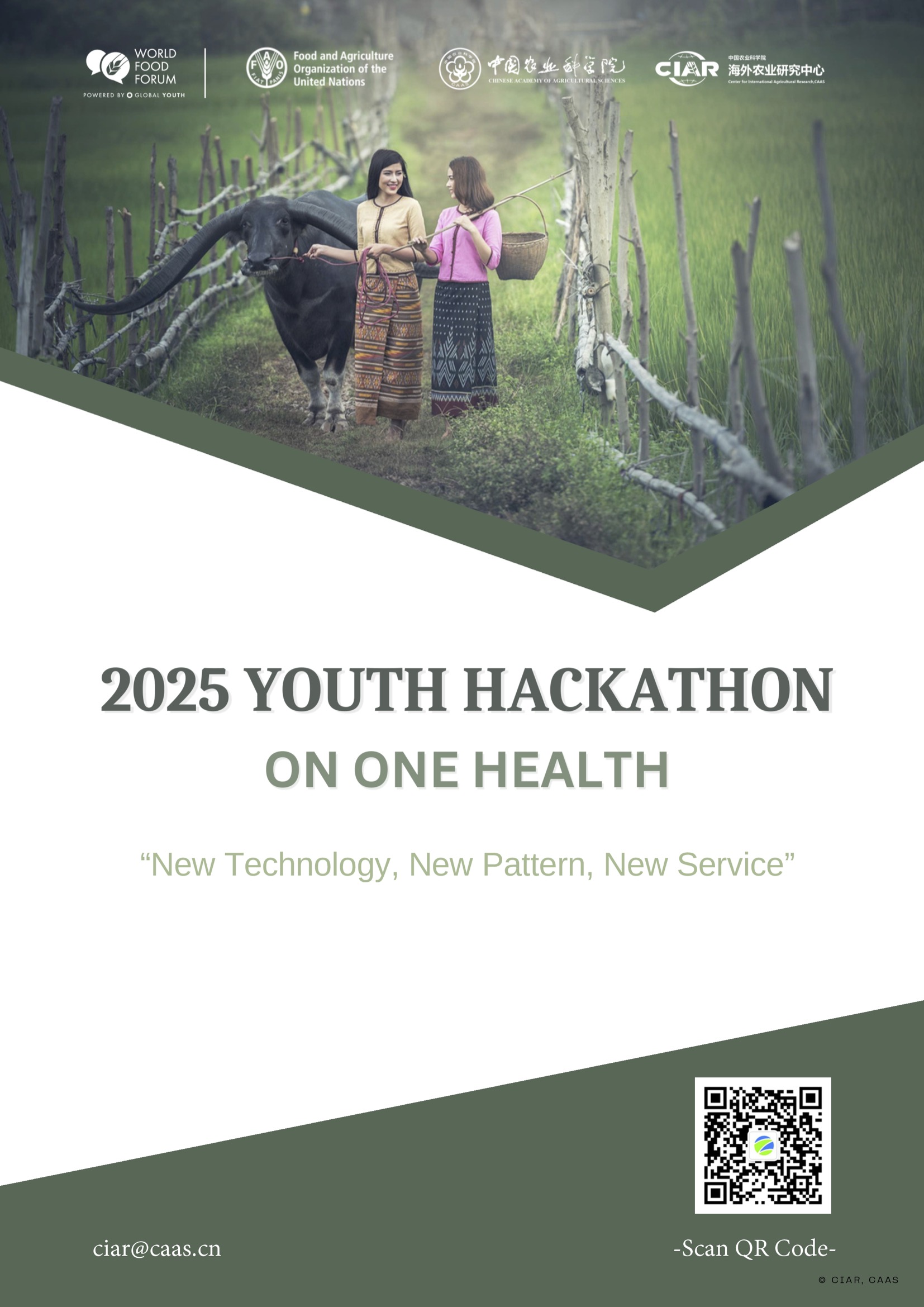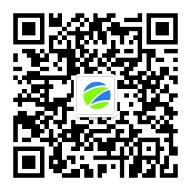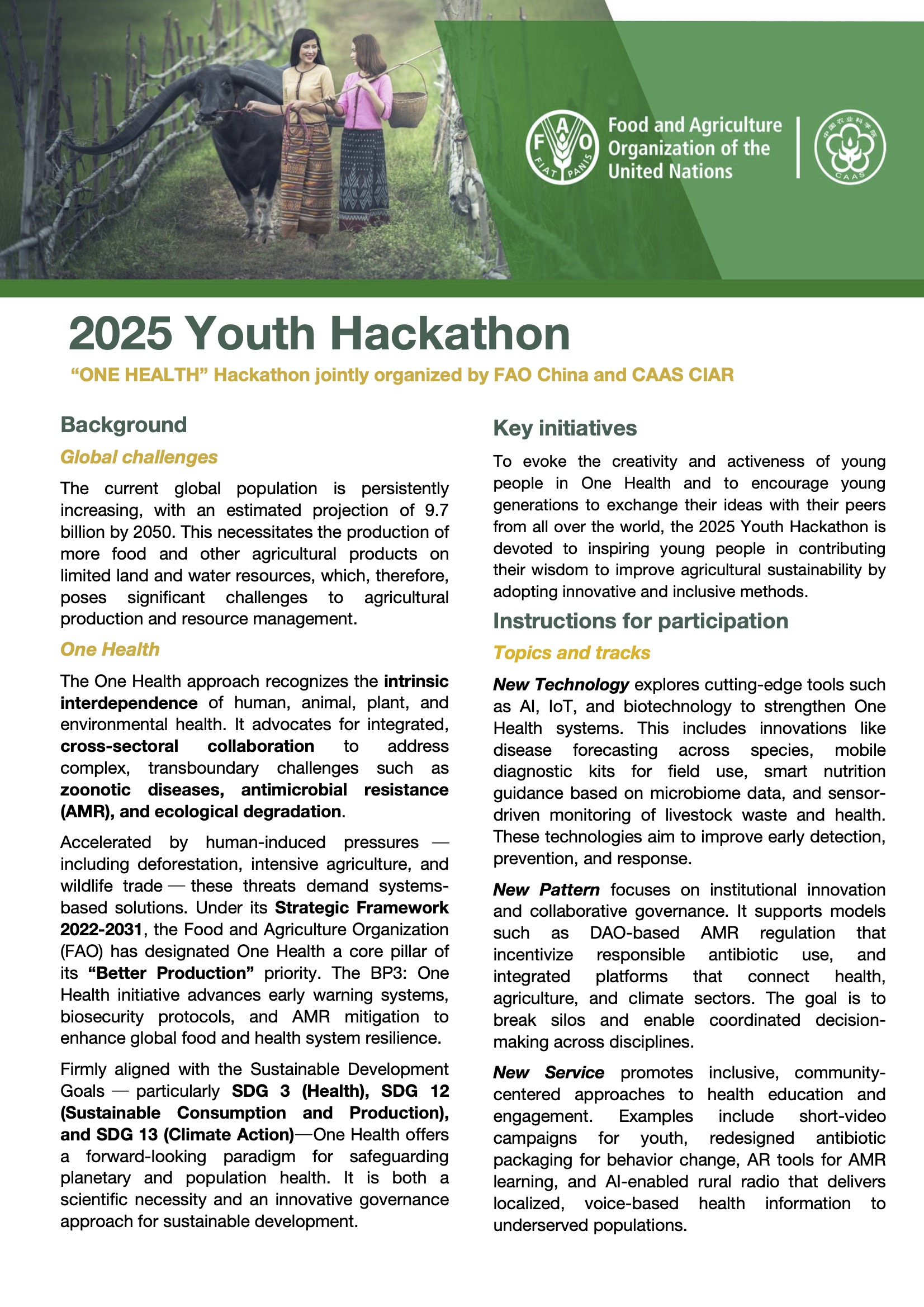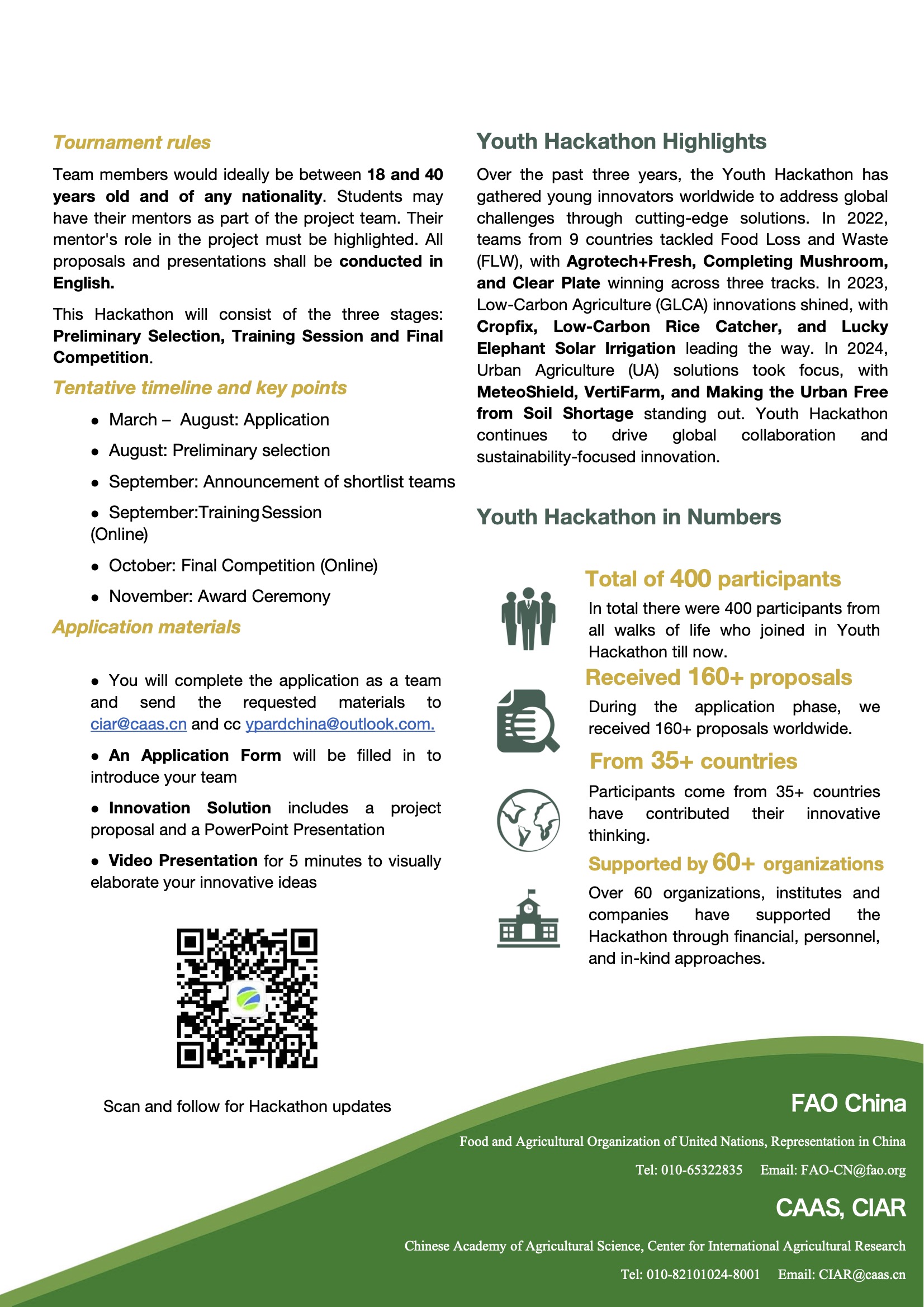Call for 2025 Youth Hackathon Application
 As the compounded impacts of global public health crises, food insecurity, and climate change continue to escalate, the concept of “One Health” has increasingly become central to international cooperation and governance. This approach emphasizes the interdependence of human, animal, plant, and environmental health, and advocates for cross-disciplinary, cross-sectoral, and cross-border systems thinking to address global challenges—ranging from disease transmission and antimicrobial resistance (AMR) to malnutrition and environmental degradation.
As the compounded impacts of global public health crises, food insecurity, and climate change continue to escalate, the concept of “One Health” has increasingly become central to international cooperation and governance. This approach emphasizes the interdependence of human, animal, plant, and environmental health, and advocates for cross-disciplinary, cross-sectoral, and cross-border systems thinking to address global challenges—ranging from disease transmission and antimicrobial resistance (AMR) to malnutrition and environmental degradation.
The 2025 “FAO-CAAS Youth Hackathon on One Health,” co-organized by FAO and the Chinese Academy of Agricultural Sciences (CAAS), invites youth innovators and interdisciplinary practitioners aged 18 to 40 from around the world to propose creative, feasible, and socially impactful solutions in the One Health.The event encourages exploration of new technologies, new patterns, and new services that advance global One Health goals.We aim to offer young people an opportunity to resonate with global issues, embarking on a journey where science and innovation are reshaped through interdisciplinary encounters. At the same time, the initiative seeks to inspire a spirit of collaboration, ignite systems thinking, and foster a collective platform for envisioning the future together. This is an opportunity for young people to resonate with global issues, a transformative journey where science and innovation are reshaped through interdisciplinary collisions, and a collective exploration that activates youth collaboration, sparks systems thinking, and builds a shared vision for the future.
Theme Of the Activities
The 2025 Youth Hackathon on One Health is centered around the theme of “One Health” and features three distinct innovation tracks: New Technology, New Pattern, and New Service. Participants are encouraged to address the complex and interconnected health challenges involving humans, animals, plants, and ecosystems. Proposals should demonstrate interdisciplinary thinking, practical feasibility, and global applicability.
Track of “New Technology”: This track focuses on leveraging data-driven solutions, intelligent systems, and frontier technologies to strengthen One Health systems. It explores the role of algorithms, sensors, and biotechnology in enhancing global health governance. Reference cases include:
● Cross-species Disease Forecasting Engine powered by AI and large language models, predicting climate-animal-human transmission pathways.
● Integrated mobile diagnostic kits (IoT + microfluidics) for Foot-and-Mouth Disease, Brucellosis, and Avian Influenza, enabling rapid screening in remote pastoral areas.
● AI-powered Nutrition Companion App, offering personalized dietary advice based on meal photos and gut microbiome prediction.
● Smart environmental monitoring modules for detecting ammonia emissions, temperature, and viral markers in livestock waste, providing early warnings for antibiotic overuse.
● LoRa-based animal health tracking system for low-connectivity outbreak regions, enabling real-time health data transmission.
Track of “New Pattern”: This track focuses on reimagining institutional frameworks, governance mechanisms, business models, and knowledge-sharing ecosystems. It seeks scalable paradigms that break disciplinary, sectoral, and community silos, supporting a “collaborative One Health” approach. Reference cases include:
● DAO-based community AMR governance pilot, where smart contracts incentivize responsible antibiotic use in livestock farming.
● Multi-agency co-governance platform integrating climate, disease, and food data—enabling collaborative simulations among agricultural, health, and environmental departments.
Track of “New Services”: This track emphasizes social innovation and community empowerment through enhanced user experiences and knowledge-sharing. It focuses on people, animals, and local communities, with a strong emphasis on inclusivity, interactivity, and cultural adaptation. Reference cases include:
● TikTok-style “One Health Challenge” video template packs for use in rural schools and youth networks to raise awareness.
● “Redesigning Antibiotic Labels” initiative—reimagining packaging with visual coding, risk-level indicators, and behavior prompts.
● Child-friendly AMR education kits or AR storybooks that translate abstract issues like drug resistance and ecological degradation into engaging animal stories.
● “AI + Rural Radio” campaign using voice assistants to broadcast localized health guidance and AMR knowledge to farmers in under-resourced areas.
Youth Hackthon Rules
(i) Tournament Rules
The 2025 Youth Hackathon is open to all young innovators with creative solutions in the field of One Health. Team members would ideally be between 18 and 40 years old, of any nationality, with participating economies across the world. Current participants may have their mentors as part of the project team. However, the application form must highlight their mentor's role in the project. Please be noted that all proposals and presentations shall be conducted in English.
This Hackathon will be divided into three stages to achieve practical and feasible innovative solutions: preliminary selection, training session, and final competition.
1. Preliminary Selection
a) Participating teams set their topics, build their teams, and submit all application materials.
b) Teams are invited to choose one of the three tracks of “New Technology, New Pattern, New Service” and develop their proposals accordingly. Submissions should include a detailed description of the idea, its potential impact, feasibility, and a preliminary implementation plan.
c) The committee will evaluate the applications and shortlist them in accordance with the three tracks, followed by a public announcement.
2. Training Session
The organizers will provide training to shortlisted teams, including:
a) Customized training: training on specific technical needs, PowerPoint production and presentation skills to each team so they may conduct presentations more professionally.
b) Public training: recommendations of relevant experts to each team according to the technology/core product involved in the project.
3. Final Competition
The Final competition will be conducted online and offline according to the situation. Each team should have a complete and refined presentation and be able to defend their proposal, to participate in the final competition.
(ii) Timeline and Key Points
⮚ Present – 19 August: Application phase
⮚ 20 August – 25 August: Preliminary selection
⮚ September: Public shortlisting
⮚ September: Training Session
⮚ The 3rd Week of October (World Food Forum Week): Final Competition (Online & Onsite)
⮚ TBD: Award Ceremony
Note: These dates are subject to change due to various factors. All participants are requested to check for the most current information released by the organizers through the provided platform or contact details.
(iii) Application Materials
Please complete the application as a team, and send the requested materials to ciar@caas.cn.
Application deadline: 19 August 2025, 23:59 (GMT+8, Beijing Time)
1. Application form (scan the QR code below for access)
2. Innovative solution for one health with materials and templates (scan the QR code below for access).
a) Project proposal in Word format, not exceeding 15 pages, with the main text in Times New Roman, font size 12, double-spaced, and demonstrative pictures, information, guide, and tables.
b) PowerPoint presentation based on the above proposal, which should not exceed 20 slides.
c) The innovative solution shall cover:
⮚ Summary of the solution (Introduce the team's ideas and what contributions will they make on one health. Up to 250 words)
⮚ Problem identification (Analysis of challenges relating to one health)
⮚ Vision, Mission and Values of the program (describing targets)
⮚ Elaboration on the program's impact on one health
⮚ Societal and economic methodology and technical models
⮚ Financial situation (capital raised, capital needed, revenue analysis)
⮚ Phased development planning (what is the potential contribution of your project 3 years later? How do you plan to achieve? What are the milestones?)
3. Video presentation (5 minutes)
a. Introduce your team (1 minute). Name, role in the team, education, experience, and qualities or skills.
b. Specify why your team should be selected by presenting the solution chosen by the team, ensuring consistency with the content of the PowerPoint (4 minutes).
c. Share the video with us. Upload the video online to a video sharing platform (YouTube, Google Cloud, Youku, Baidu Cloud or other platforms). Please share the link to the video in the application, ensuring it can be downloaded.
4. Scan the QR Code below

(Please scan the QR code for the application form and other application materials)
(iv) Awards and benefits for the Participants
⮚ A cash prize and a certificate provided by FAO and CAAS.
⮚ Comprehensive experience of an independent innovation and entrepreneurship activity along with partners who share the same values.
⮚ Networking with other teams, UN agencies, CAAS, and partners in the field for future collaboration.
⮚ Feedback and support from industry experts and mentors and gaining valuable insight and ideas on strategic thinking on sustainable agriculture and carbon mitigation under the new paradigm.
⮚ Inspiring workspace where perspectives from different cultural backgrounds are welcomed.
⮚ Referral to pursue educational opportunities for graduate or Ph.D. degrees in CAAS, and preferential access to internships within the Center for International Agricultural Research (CIAR) and FAO.
Cooperation Partners
Host Organization |
Food and Agriculture Organization of the United Nations |
Department of International Cooperation of Chinese Academy of Agricultural Sciences |
Center for International Agricultural Research of Chinese Academy of Agricultural Sciences |
Young Professionals for Agricultural Development |
Supporting Organization |
World Food Forum |
Harbin Veterinary Research Institute, Chinese Academy of Agricultural Sciences |
Institute of Plant Protection, Chinese Academy of Agricultural Sciences |
Institute of Food and Nutrition Development, Ministry of Agriculture and Rural Affairs |
National veterinary drug industry technology innovation alliance |
Other Information
For inquiries or more information, please send an email to
(For people who have WeChat) Get first-hand messages, welcome to follow the official WeChat accounts of CIAR.







